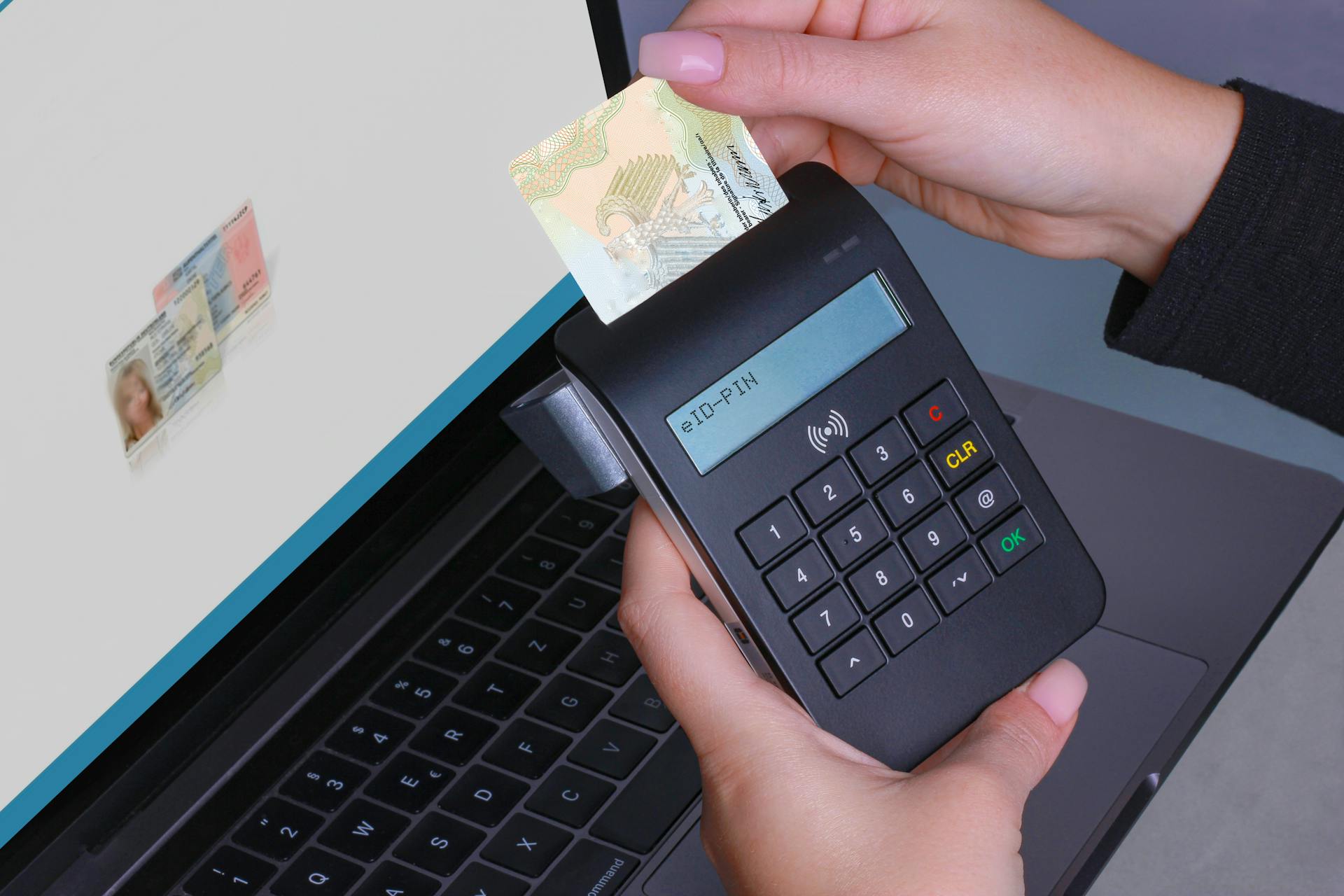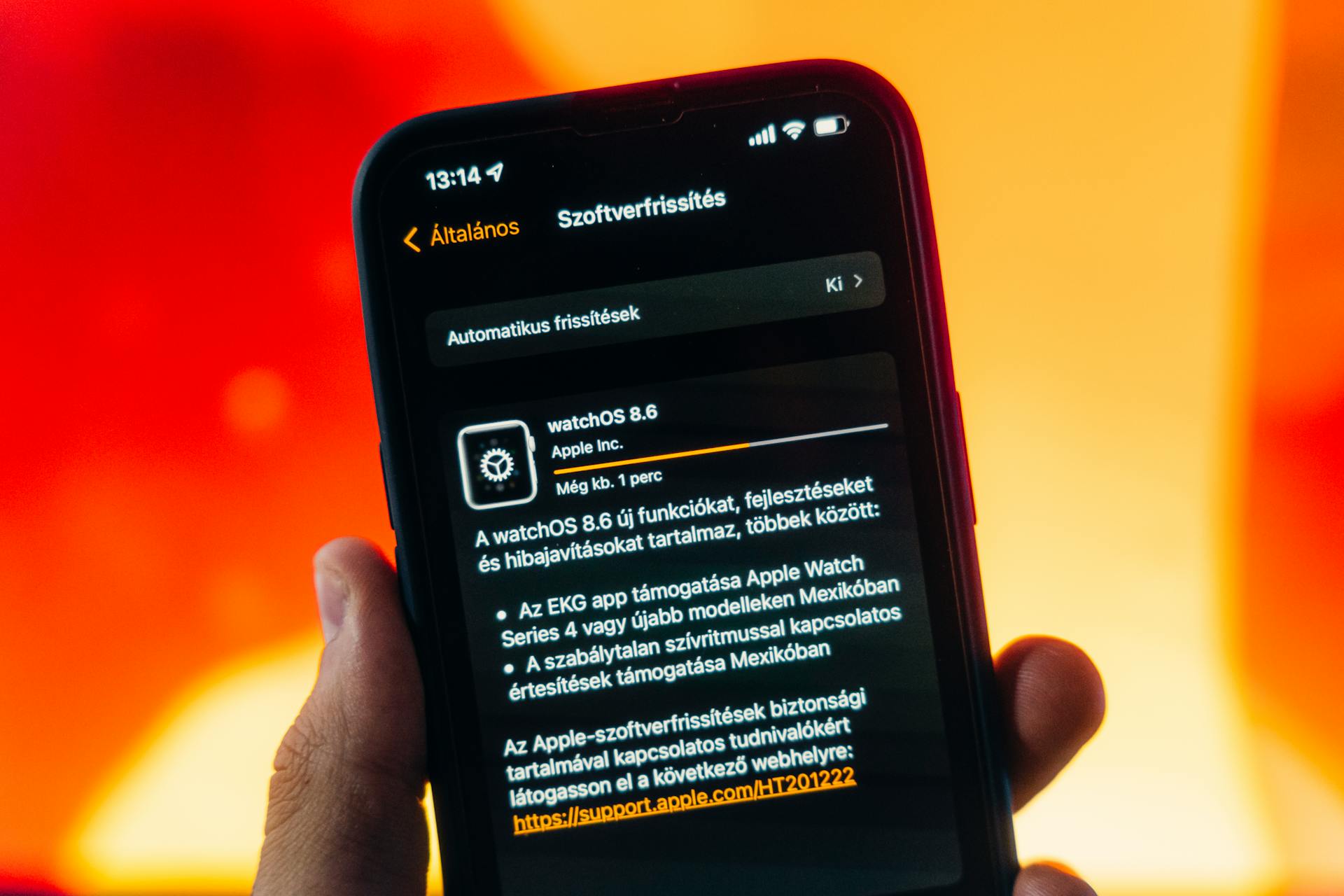
KYC Online is a digital onboarding process that verifies an individual's identity and checks their suitability for a financial product or service. This process is designed to be secure, efficient, and compliant with anti-money laundering regulations.
KYC Online typically involves a series of checks, including verifying an individual's name, date of birth, and address, as well as checking their identity documents, such as a passport or driver's license.
These checks are usually conducted using a combination of automated systems and human review, with the goal of minimizing the risk of money laundering and other financial crimes.
KYC Online can be conducted remotely, using digital identity verification tools, which makes the process faster and more convenient for customers.
Discover more: Kyc Identification
What Is KYC Online?
KYC online is a process that makes it easier for institutions to authenticate their customer's identity and address details. KYC stands for Know Your Customer, which is a mandatory exercise under the Prevention of Money Laundering Act, 2002.
To establish an individual's identity and address, KYC requires relevant supporting documents, such as photo IDs like PAN card and Aadhar card, In-Person Verification (IPV), and proof of address. This process is divided into two parts: Part I, which comprises the necessary KYC details as recommended by the Central KYC registry, and Part II, which seeks additional KYC information separately by the financial intermediary.
The KYC process can be completed online, making it more convenient for customers. However, it's essential to provide accurate and authentic documents to ensure smooth verification.
Here's a breakdown of the two parts of the KYC process:
Types of KYC
There are several types of KYC processes, each catering to different customer verification needs.
Aadhaar based KYC is one of the types, which allows you to complete the process online. You can make mutual fund investments of up to Rs.50000 per year using this method.
Offline KYC, also known as In-Person-Verification (IPV) KYC, is another type that requires you to visit a physical location for verification. If you want to invest more than Rs.50000 per financial year, you'll need to complete this type of KYC as well.
Here are the main types of KYC in India:
- Aadhaar based KYC (eKYC)
- Offline KYC or In-Person-Verification (IPV) KYC
KYC Process
The KYC process is a crucial step in verifying a customer's identity, and there are two main ways to complete it online: Aadhaar-based biometric KYC or Aadhaar OTP. The Aadhaar OTP method is the quickest, taking just a few minutes to complete.
To complete the Aadhaar OTP method, you'll need to visit the official KYC online portal, log in with your registered mobile number, and enter the OTP received. You'll also need to make a self-attested copy of your e-Aadhaar and upload it.
You can also perform a KYC status check online to verify your progress. The entire process can be completed in less than 24 hours, making it a convenient and efficient option for customers.
Here are the minimum requirements to open an individual financial account, as per the Customer Identification Program (CIP): NameDate of birthAddressIdentification number
These requirements are clearly delimited in the CIP, and institutions must verify the identity of the account holder "within a reasonable time."
You might like: Kyc Steps
Customer Identification Program
The Customer Identification Program (CIP) is a crucial component of the KYC process. It's designed to ensure that financial institutions accurately identify their customers and assess the risks associated with them.
In the US, the CIP is mandated by the Patriot Act, which aims to prevent money laundering, terrorism funding, and other illegal activities. The CIP requires financial institutions to verify the identity of their customers through various means, including documents, non-documentary methods, or a combination of both.
The minimum requirements to open an individual financial account are clearly delimited in the CIP: name, date of birth, address, and identification number. These requirements must be verified within a reasonable time frame.
A risk assessment is a critical element of a successful CIP. Financial institutions must determine the level of risk associated with each account and implement policies to mitigate those risks. The risk assessment considers factors such as the types of accounts offered, the methods of opening accounts, the types of identifying information available, and the institution's size, location, and customer base.
Intriguing read: Cip vs Kyc
Here are the key factors to consider when implementing a CIP:
- The types of accounts offered by the bank
- The bank's methods of opening accounts
- The types of identifying information available
- The bank's size, location, and customer base, including the types of products and services used by customers in different geographic locations
By following these guidelines, financial institutions can ensure that their CIP is effective in identifying and assessing customer risks, reducing the risk of financial losses, and promoting regulatory compliance.
Paper-Based
Paper-based KYC is a traditional method that requires individuals to submit photocopies of documents like ID proofs and address proof in person.
This method can be time-consuming and cumbersome, but it remains essential for customers without access to digital alternatives.
In some cases, customers may not have the option to use digital KYC, making paper-based the only viable choice.
It involves collecting physical documents from customers to verify their identity and address, which can be a lengthy process.
Additional reading: What Is the Kyc Documents
KYC Requirements
To open an online savings account using Video KYC (V-KYC), you'll need to meet certain requirements.
A robust Customer Identification Program (CIP) is essential for regulatory compliance and preventing fraudulent activities.
You'll need to provide your Aadhaar Number, PAN Number, and a valid Mobile Number Registered with Aadhaar to initiate the process.
Here are the mandatory requirements for Video KYC: Aadhaar NumberPAN NumberValid Mobile Number Registered with AadhaarValid E-mail IdInternet Enabled Device - Mobile, TAB, Laptop (preferably mobile)Web cam enabled Desktop with Microphone system
In addition to the above requirements, you'll also need to have a White sheet of Paper and Blue Ball pen ready.
For more insights, see: Aml Kyc Requirements
Mandatory Requirements
To open an online savings account using Video KYC, you'll need to meet certain mandatory requirements. These requirements are in place to ensure a smooth and secure process.
You'll need to provide your Aadhaar Number, which is a unique identification number issued by the Indian government. This is a crucial piece of information that will help verify your identity.
A valid PAN Number is also required, which is a unique 10-digit alphanumeric code that serves as proof of identity and address.
In addition to these documents, you'll need to have a valid Mobile Number Registered with Aadhaar and a valid E-mail Id.
To complete the Video KYC process, you'll also need an Internet Enabled Device, such as a Mobile, TAB, Laptop, or Desktop with a webcam and microphone system.
Here are the mandatory requirements in a concise list:
- Aadhaar Number
- PAN Number
- Valid Mobile Number Registered with Aadhaar
- Valid E-mail Id
- Internet Enabled Device - Mobile, TAB, Laptop (preferably mobile)
- Web cam enabled Desktop with Microphone system
Eligibility
To open an online savings account using Video KYC (V-KYC), there are certain eligibility criteria you need to meet.
First and foremost, you must be a Tax Resident Indian Individual aged 18 and above.
It's also worth noting that this account is only available to New to Bank (NTB) customers, as there's a dedupe check in the system to prevent existing customers from opening a new account.
The account can only be opened in a single name and can be operated by the customer themselves only.
Additionally, the customer should not be a politically exposed person, nor should they be declared lunatic or blind.
On a similar theme: Kyc Account
KYC Documents
KYC documents are a crucial part of the online KYC process, and understanding what they are and what's required can make a big difference in getting approved quickly and efficiently.
Common types of KYC documents include government-issued photo IDs, proof of address documents, and financial documents like income proof and bank statements. These documents help financial institutions verify your identity and assess your financial status.
To open an individual financial account, you'll typically need to provide the following minimum requirements: your name, date of birth, address, and identification number. This information must be verified within a reasonable time by the institution.
Here's an interesting read: Kyc Address Verification
A robust Customer Identification Program (CIP) is essential for delivering regulatory compliance and preventing fraudulent activities. The CIP mandates that any individual conducting financial transactions needs to have their identity verified.
You'll need to provide proof of identity, which can include documents like a PAN card, Aadhaar card, passport, driver's license, or an ID card issued by any central or state department. You can also use an ID card issued by banks and public financial institutions, or an ID card issued by colleges affiliated with universities.
Here's a list of some common proof of identity documents:
- PAN card
- Aadhaar card, passport, driver’s licence.
- ID card with photo issued by any central/ state department, statutory/ regulatory authorities.
- ID card issued by banks and public financial institutions.
- ID card issued by colleges affiliated with universities.
For proof of address, you can use documents like a passport, voter's ID, lease agreement, ration card, or flat maintenance bill. You can also use utility bills like gas or electricity bills that are less than 3 months old, or bank statements. ID cards with address on them and proof of residence issued by a notary public, gazetted officer, parliament, bank managers, multinational foreign banks, or scheduled cooperative banks are also accepted.
These documents may seem like a hassle, but they're essential for ensuring the security and integrity of online financial transactions. By understanding what's required and being prepared, you can make the process smoother and faster.
Explore further: Palau Id Kyc
KYC in Specific Sectors
Banks are often the first to reflect new KYC requirements, as they provide a variety of financial services and deal with significant amounts of accounts, money, and transactions.
To maintain trust with customers, banks are leveraging technologies like APIs, AI/ML, biometrics, and advanced optical character recognition to improve identity verification speed, accuracy, and reliability.
Most other financial services have KYC requirements similar to banks, requiring them to perform KYC and monitor customer transactions to detect money laundering schemes.
Financial institutions must verify the origin of larger sums and report cash transactions exceeding threshold limits, keeping extensive records on every significant financial transaction.
In the crypto sector, regulators and industry participants are creating programs to deter money laundering and other financial crimes by identifying red flags such as creating separate accounts under different names or declining requests for KYC documents.
Here are some common red flags to look out for in the crypto sector:
- Creating separate accounts under different names
- Initiating transactions from non-trusted IP addresses
- Incomplete or insufficient KYC information
- Customers declining requests for KYC documents or inquiries regarding the source of funds
- Customers providing forged or falsified identity documents or photographs
- Customers who are on watch lists
- Customers who frequently change their identification information
KYC is also crucial for investments and life insurance, ensuring that policy purchases are made by real people and curbing instances of black money.
Aadhaar-Based eKYC
Aadhaar-based eKYC is a digital verification process that utilizes an individual's Aadhaar number to authenticate their identity. This method allows for quick, paperless verification, significantly reducing the time and effort involved in traditional KYC procedures.
The entire process is often mobile or internet-only, delivering a smooth, convenient experience for the customer. With Aadhaar-based eKYC, you can complete the KYC process in just a few minutes.
There are two ways to complete your online KYC verification: Aadhaar-based biometric KYC or Aadhaar OTP. The latter is the quickest method, allowing you to complete the KYC process in just a few minutes.
Here are the steps to follow for Aadhaar OTP:
- Visit the official KYC online portal of the KRA (KYC registration agency).
- Log in with your registered mobile number and enter the OTP received.
- Make a self-attested copy of your e-Aadhaar and upload it.
- Accept the terms and conditions.
Alternatively, you can use Aadhaar-based biometric KYC, which requires an authorized representative to visit your address. This method takes a bit longer, but it's still a convenient option.
KYC verification online can be completed in less than 24 hours, and you can perform a KYC status check online to verify your progress. It's advisable to verify your KYC as soon as possible, especially if you're dealing with banks and NBFCs.
See what others are reading: Uscis E Verify Check
Banks
Banks play a crucial role in implementing effective KYC procedures to prevent money laundering and other financial crimes. This is because banks provide a variety of financial services and deal with significant amounts of accounts, money, and transactions.
As more banking activities go digital, consumers have high expectations for identity verification, with 62% expecting to verify their identity when opening an account digitally.
Banks use advanced technologies such as APIs, AI/ML, biometrics, and advanced optical character recognition (OCR) to gather more information and analyze it more intelligently, resulting in a higher likelihood of detecting synthetic and fraudulent identities.
To determine the level of risk, banks vary KYC completion and updates periodically from one account to another, based on the bank's perception of risk.
Here are some common transactions that require KYC:
- Opening bank accounts
- Making investments in fixed deposits
- Recurring deposits
- Mutual fund accounts
- Online investments
By ensuring an individual's identity, banks can easily predict and prevent fraud, making KYC a crucial step in the banking process.
Investments/Life Insurance
KYC information is required for investments and life insurance purchases to prevent black money and ensure the transactions are made by real people.
The KYC procedure is mandated by IRDAI and SEBI, and it must be completed through a KYC Registration Agency (KRA) for life insurance and mutual fund investors.
You need to update your KYC information to open a Demat and stock trading account, a bank account, fixed deposit account, or purchase life insurance.
For digital money transfers and other financial transactions with a registered body, KYC is also essential.
Without a KYC update, you cannot open or conduct any financial transactions in India.
Consider reading: Business Insurance Proceeds Tax Treatment
Aadhaar Based Identity Verification
Aadhaar-based identity verification is a digital process that uses an individual's Aadhaar number to authenticate their identity. This method allows for quick, paperless verification, significantly reducing the time and effort involved in traditional KYC procedures.
Aadhaar-based eKYC is a digital verification process that utilizes an individual's Aadhaar number to authenticate their identity, enhancing convenience and accessibility while ensuring compliance with regulatory standards.
Here's an interesting read: Digital Onboarding Kyc
To complete Aadhaar-based KYC, you'll need to provide your Aadhaar card number, registered mobile number, and verify them using OTP. You'll also need to upload a self-attested copy of e-Aadhaar after accepting the consent declaration terms for the e-KYC.
The required documents for Aadhaar-based KYC include the original Aadhaar card, original PAN, a white sheet of paper, and a blue ball pen. The device used for verification should be internet-enabled with good internet speed.
Aadhaar-based biometric KYC involves visiting the official KRA website and choosing the biometric authentication option, after which an authorized representative will visit your address to verify your identity.
Here are the steps to complete Aadhaar-based biometric KYC:
- Visit the official KRA website.
- Choose the biometric authentication option.
- Wait for an authorized representative to visit your address.
- Show original documents as requested and await KYC approval.
Aadhaar-based identity verification is a secure and efficient process that can be completed in less than 24 hours, making it an ideal solution for individuals and businesses alike.
Frequently Asked Questions
How do I get KYC digitally approved?
To get KYC digitally approved, log in to your UAN Member Portal on the EPFO website and follow the steps to update and approve your KYC details. Once you've completed the process, you can check the status of your KYC approval.
How to apply for KYC online?
To apply for KYC online, log in to the KRA's official portal with your registered mobile number and follow the prompts to complete the registration process. You'll need to upload a self-attested copy of your e-Aadhaar and accept the terms and conditions.
Sources
- https://www.trulioo.com/blog/kyc
- https://www.bankofbaroda.in/personal-banking/accounts/saving-accounts/online-savings-account-using-video-kyc
- https://www.bajajfinserv.in/what-is-kyc
- https://www.maxlifeinsurance.com/blog/tax-savings/what-is-kyc
- https://www.pan.utiitsl.com/panonline_ipg/forms/pan.html/preForm
Featured Images: pexels.com


